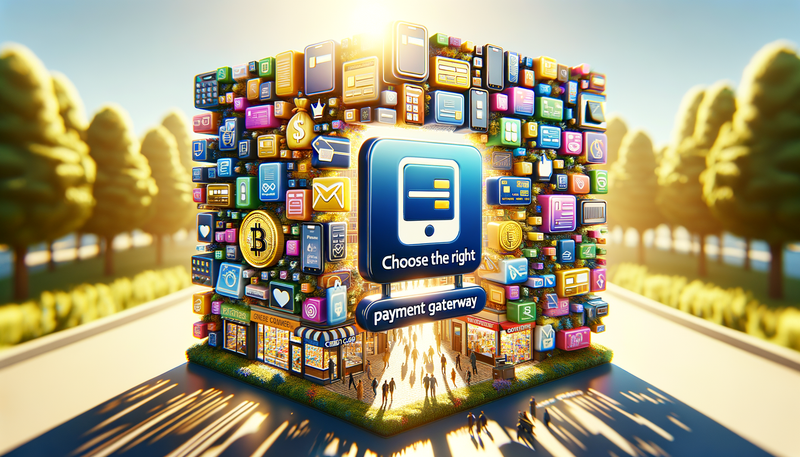How to Choose the Right Payment Gateway for Your Online Store
Selecting the right payment gateway for your online store is crucial for ensuring smooth transactions and customer satisfaction. With numerous options available, navigating the complex world of online payments can be challenging. This article will guide you through the essential factors to consider when choosing a payment gateway, including security features, integration options, and associated fees. By understanding these key elements, you'll be better equipped to make an informed decision that aligns with your business needs and provides a seamless checkout experience for your customers. We'll explore the importance of PCI compliance, discuss various integration methods, and delve into the fee structures of different payment gateways to help you find the perfect solution for your e-commerce venture.Table of Contents:

Understanding Payment Gateways
A payment gateway is a crucial component of any e-commerce website, serving as the intermediary between your online store and the payment processor. It securely transmits transaction data from your customers to the payment processor and back, ensuring that sensitive financial information is protected throughout the process. Payment gateways come in various forms, including hosted solutions, integrated options, and API-based systems. Each type offers different levels of customization and control over the checkout process. When choosing a payment gateway, it's essential to consider factors such as security features, ease of integration, supported payment methods, and compatibility with your e-commerce platform. By selecting the right payment gateway, you can provide a seamless and secure shopping experience for your customers while streamlining your business operations. Do you need a website? Want to build a website but don't know where to start? Our website builder is the perfect solution. Easy to use, and with the ability to customize to fit your business needs, you can have a professional website in no time.
Security Features to Look For
Security should be your top priority when selecting a payment gateway for your online store. Look for gateways that offer robust security features to protect both your business and your customers' sensitive information. Key security features to consider include:1. PCI DSS Compliance: Ensure the gateway adheres to Payment Card Industry Data Security Standards to protect cardholder data.
2. SSL Encryption: Look for gateways that use Secure Sockets Layer (SSL) encryption to safeguard data transmission.
3. Tokenization: This feature replaces sensitive card data with unique identifiers, reducing the risk of data breaches.
4. Fraud Detection Tools: Advanced fraud screening and prevention tools can help minimize the risk of fraudulent transactions.
5. 3D Secure: This additional layer of authentication adds an extra security step for online transactions.
By prioritizing these security features, you can protect your business and build trust with your customers, encouraging them to shop confidently on your website.
Integration Options and Compatibility
When choosing a payment gateway, it's crucial to consider how well it integrates with your existing e-commerce platform and other business tools. Most modern payment gateways offer various integration options to suit different technical requirements and skill levels. These options typically include:1. Hosted Payment Pages: A simple solution where customers are redirected to a secure, gateway-hosted page to complete their payment.
2. API Integration: Offers more control and customization, allowing you to keep customers on your site throughout the checkout process.
3. Plugin or Module Integration: Many popular e-commerce platforms offer pre-built integrations for various payment gateways, simplifying the setup process.
4. Mobile SDK: Essential for businesses with mobile apps, allowing seamless integration of payment functionality.
Consider your technical capabilities and resources when choosing an integration method. Additionally, ensure that the payment gateway is compatible with your current and future business tools, such as accounting software or customer relationship management systems, to streamline your operations and avoid potential conflicts.
Building a website with SITE123 is easy
Understanding Fee Structures
Payment gateway fees can significantly impact your bottom line, so it's essential to understand the various fee structures before making a decision. Common fee types include:1. Transaction Fees: A percentage of each transaction, often accompanied by a flat fee.
2. Monthly Fees: A recurring charge for using the gateway's services.
3. Setup Fees: One-time charges for account activation and integration.
4. Chargeback Fees: Costs associated with disputed transactions.
5. Currency Conversion Fees: Applicable when accepting payments in multiple currencies.
Compare the fee structures of different gateways, considering your sales volume and average transaction value. Some gateways offer tiered pricing or volume discounts, which can be beneficial for high-volume businesses. Be wary of hidden fees or long-term contracts that may lock you into unfavorable terms. Look for transparency in pricing and choose a gateway that offers a fee structure aligned with your business model and growth projections.
Supported Payment Methods and Currencies
To cater to a diverse customer base and maximize sales potential, choose a payment gateway that supports a wide range of payment methods and currencies. Consider the following factors:1. Credit and Debit Cards: Ensure support for major card networks like Visa, Mastercard, and American Express.
2. Digital Wallets: Look for gateways that integrate with popular options like Apple Pay, Google Pay, and PayPal.
3. Alternative Payment Methods: Consider support for region-specific payment options if you operate internationally.
4. Recurring Payments: Essential for subscription-based businesses or installment plans.
5. Multi-Currency Support: Crucial for businesses serving international customers.
By offering a variety of payment options, you can cater to customer preferences and reduce cart abandonment rates. Additionally, supporting multiple currencies can help you expand into new markets and provide a localized shopping experience for international customers.
Customer Support and Reliability
When dealing with financial transactions, reliable customer support and system uptime are critical. Consider the following aspects when evaluating payment gateways:1. Support Availability: Look for gateways offering 24/7 support through multiple channels (phone, email, live chat).
2. Response Time: Check reviews and ask about average response times for support inquiries.
3. Documentation and Resources: Comprehensive guides and developer resources can help streamline integration and troubleshooting.
4. System Uptime: Research the gateway's track record for reliability and uptime guarantees.
5. Scalability: Ensure the gateway can handle your current and projected transaction volumes.
A responsive and knowledgeable support team can be invaluable when dealing with payment issues or technical difficulties. Similarly, a reliable system with high uptime ensures that your customers can complete transactions without interruption, maintaining a positive shopping experience and protecting your revenue stream.





